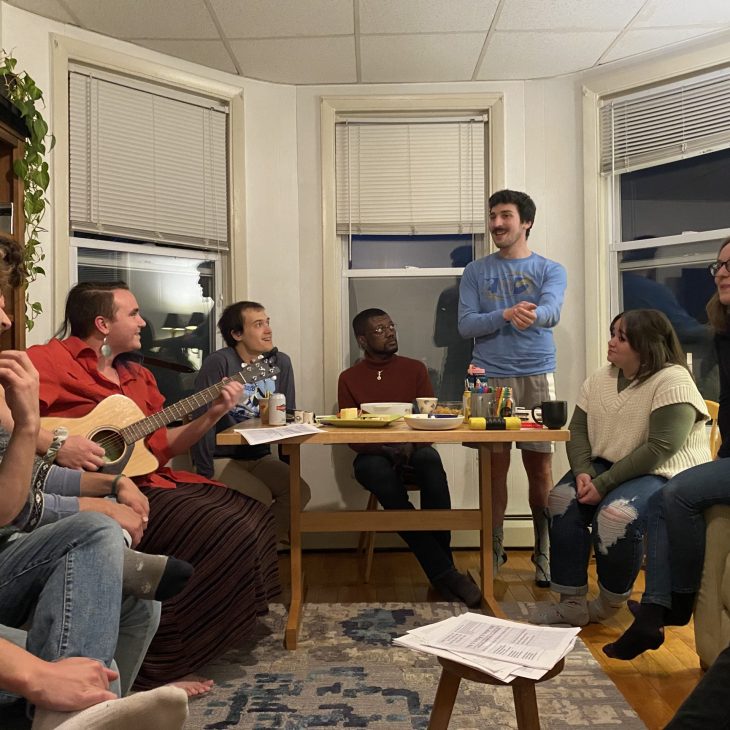Welcome to the Table: Why I Love Hosting Interfaith Meals
November 23, 2022

When it comes to food, our senses unlock our history; each smell, vision, and flavor is a key.
For me, the aroma of matzah ball soup sends me back to Passover Seder. I recall the way my family – mirroring the elongated table we ate at – expanded to include friends, cousins, and strangers. If I try for a moment, I can feel the bustle of bodies squeezing between folding chairs and improbably balanced platters. I can hear the air vibrating with conversation like subtle background music. Eating can be so much more than sustenance – it’s a chance to pause and appreciate, to connect, to learn, and to laugh.
From an early age, I was lucky to see what it looked like to take part in a purposeful, communal meal. Growing up, the most memorable of gatherings tended to revolve around Jewish holidays and traditions. Members of our temple certainly came over, but so did others of different faiths who shared our values of compassion and community. More than just holidays, my parents strove to make each week special through observing Shabbat, a traditional Jewish dinner held on Friday nights. To this day, when I see the twin flames of Shabbat candles and taste the sweet wine, I think back to my childhood sitting around our wooden table breaking bread so many Friday nights.
When I became a student at the University of Vermont, I knew that I wanted to host my own gatherings and bring people with different worldviews together for conversation and food. I wanted to share my experience with Jewish traditions, and I also wanted to create a space for others to explore their culture and spirituality. Out of this desire was born my first interfaith meal consisting of a few friends in the dorm kitchen assembling a slapdash Shabbat. We cooked, we ate, we laughed, and we loved it. Eight years later some things about dinner look different, but what hasn’t changed is my love of bringing people together to challenge assumptions, have fun, and rejoice in community.
This past year, I’ve hosted interfaith meals monthly. Here’s my advice as a host: Share something important to you while making space for others to do the same. What you share could be anything – a culture, a skill, a story… simply reflect for a moment on what has brought joy and meaning into your life. Sharing what you care about with others – being vulnerable – can be scary, but all forms of intimacy involve risk. If we don’t take these risks, if we don’t open our hearts, we miss out on so much of the richness and depth possible in our relationships.
I can still think back to the first time I brought my guitar out at an interfaith dinner. I was nervous and intimidated because I was sharing Jewish songs I grew up with (Miriam’s Song, Shalom Aleinu, etc.), but had never led. My singing was (is) a far cry from perfect. When I finally did play, and when I did falter, it was that much more meaningful to hear other voices reach out and take their own risk.
Over the years, I’ve reflected on what has made these meals so compelling to me. I’ve found that when people gather for a reason, it gives permission to explore ideas and stories that might not be told at a normal dinner. When I host an interfaith meal, I do my best to make sure that it is not “normal”. My aim is to create a space as vivid and inviting as I recall my childhood home being. Ultimately, my goal is to make the night an island of peace: a time to tell old stories, a time to think about the future, and, most of all, a time to be present.
For tips on hosting your own interfaith meal, read “How to Plan to an Interfaith Meal in 6 Easy Steps.”
Matthew Segil is a middle school math and science educator in Massachusetts for over four years. During his time as a teacher, he’s invited colleagues to his house for interfaith dinners centered around the Jewish practice of Shabbat. As an interfaith leader, it is his goal to build an inclusive community focused on education, joy, and cultural exchange. Contact Matthew on LinkedIn.
Share
Related Articles



